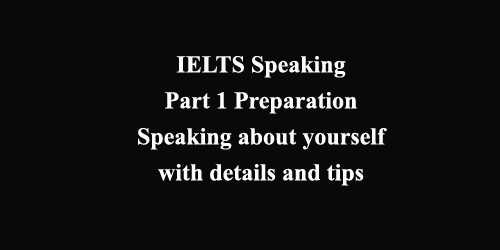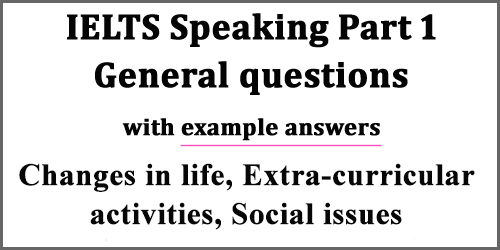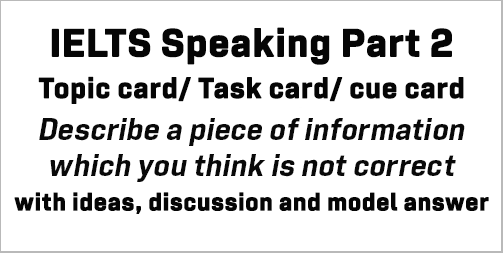IELTS Speaking Part 1: how to speak about yourself
Hello, it’s good to be back today with a very important issue on IELTS Speaking Part 1. A number of students and close ones have requested me to post something on “Speaking about Yourself/ Myself”. Well, it is a general trend that you are asked to speak in short or asked some short questions about yourself in different interview-based exams like IELTS. Though many people find it very easy, there are a few of you who might consider this post extremely valuable. Try to read the next few paragraphs with patience and passion. It will surely help you to get a great band score on IELTS Speaking Test. It is because you will find some genuine words, advice, examples, and tips on Speaking about yourself.

First impression! It is a very common yet misunderstood phrase by us. As IELTS Speaking is an interview-based exam, many seem to believe that the first impression indicates the look of a person. Wrong! It never considers a person’s look; rather it considers how you answer the questions! It’s all about that. By ‘first impression’ we mean the impression you create on your examiner’s mind through your performance at the very beginning of the test itself. It means your answers in Part 1 have made your examiner to consider you as an English speaker of the preliminary, intermediate, or expert level. Therefore, if you give silly answers in Part 1, remember that your exam is going to be a disaster. And there is ample evidence in support of what I’ve just said. So, how to impress your examiner in the beginning? Let’s have a look.
- Make yourself comfortable but maintain the common standard of the interview. Don’t give a rigid or uncomfortable look. Answer with confidence. And surely try to avoid answering with only yes/no. Try to explain your answer a little.
- When your name is asked, don’t just tell your nickname. First, tell your good name or the name written on your passport, then say “You can call me …….(your nickname)…… if you like.”
- When you are asked a question like this- “Tell me something about yourself”, what most people do is that they include information about their family. Please, avoid that. You and your family are two different matters. Don’t attach them. That’s a wrong strategy. Here, you can pursue the following idea:
Name→Age→Profession/job→Marital status (for those who are married)→likes/hobbies/pastime activity (in short)→aim in life (if you want) etc.
- The examiner also asks you a few short questions about yourself or your family. Try to answer them in brief. But, say at least one complete sentence for each question. Take note that Speaking Part 1 focuses on your ability to describe, express preferences, give reasons, etc. In-depth answers are not expected from you. For instance, in the answer to the question “What are you doing at the moment?”, you should say, “I’m a student or I’m studying Diploma in ……”. But never say, “Student”. That’s wrong!
- You are generally asked about the reason behind your taking the IELTS test. Be reasonable when you answer it. Don’t try to give any extra-smart answers. That might create a bad impression. For example, if you are really applying for a student or professional visa, include the information in the answer. You don’t need to say that you want to check your ability just to make sure you know good English. Avoid doing such mistakes.
- The examiner also asks you some common questions on topics like studies, travel, sports, family, food, and exercise. Not all, but 3 to 4 questions on 1 or 2 such topics. This also represents your lifestyle. You need not explain your answers here. Just tell me what you know. For this, you need good preparation on the topics. So, be ready before you register for the exam.
- Avoid giving a negative response. In this part, if you say you don’t know the answer, the examiner will surely grade you as a preliminary English speaker. This will affect your band score.
Finally, the best advice for doing good in Part 1 is this:
Take good preparation for short and easy questions and avoid negative answers. Appear in personally arranged mock tests with a good English speaker you know. Doing so, you will become confident and this confidence is important on exam day. It will create a good image of you in the mind of your examiner.
I hope you like this post and find the information helpful for your IELTS Speaking preparation. Remember to keep yourself busy with IELTS-related work.
Happy IELTS!
Cambridge IELTS 12 Test 4: Complete Speaking Test with answers
Click here for solutions to Cambridge Test 6; complete Speaking test
IELTS Speaking Part 2: A teacher who has greatly influenced your academic life
Cambridge IELTS 12 Test 5; complete the Speaking test with model answers
Use of cohesive devices/ connectors/ linking words in IELTS
IELTS Speaking Part 2: Something useful you learned from your family
6 IELTS Preparation Tips for Reading Section
IELTS Reading: 10 steps which helped me to score 8.0 in Reading
Strategy for IELTS Reading: TRUE, FALSE, NOT GIVEN or YES, NO, NOT GIVEN




Wow I love this, thank you so much to elaborate on this